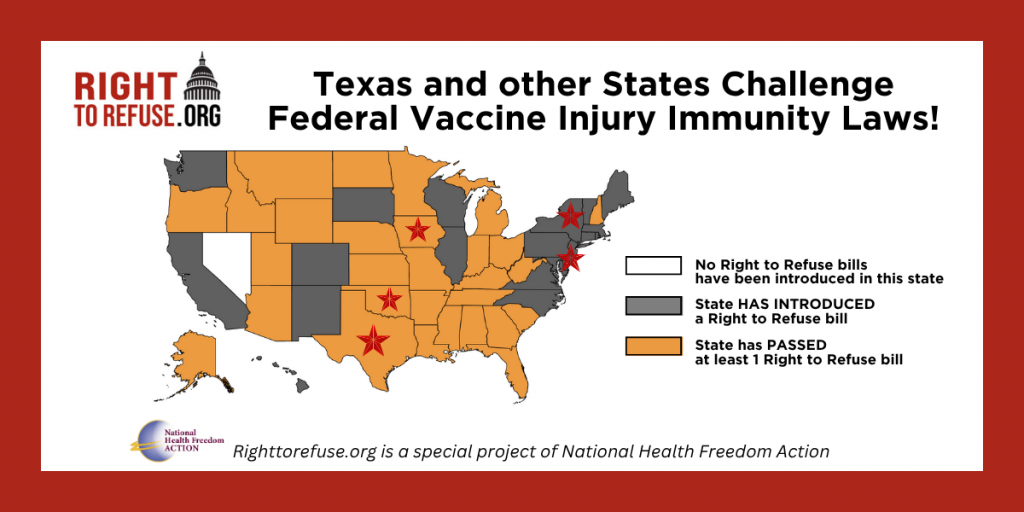

Many health freedom issues involve tensions between federal and state law: from EMF exposure to GMOs, state efforts to protect freedom are often stymied by federal “preemption.” Generally, federal law preempts or precludes contrary state laws under the Supremacy Clause of the US Constitution. Also, our Supreme Court has held that the Commerce Clause implicitly restricts states’ ability to impose excessive burdens on interstate commerce.
Today around the USA, states are taking action on vaccine manufacturers’ liability, despite federal laws limiting the right to sue. One bright light is Texas, where the Governor just signed a law holding vaccine makers liable if they advertise the vaccine in the state. Other states have introduced bills with creative solutions to the problem of liability for vaccine injury and death.
National Childhood Vaccine Injury Act of 1986
Under the National Childhood Vaccine Injury Act of 1986 (NCVIA), vaccine manufacturers have broad liability immunity for vaccines recommended for routine use in children. This law includes the National Vaccine Injury Compensation Program (VICP), a federal trust fund that compensates individuals for injuries or deaths allegedly caused by covered vaccines. And the Supreme Court has ruled that this law preempts any state law claims for injury from defectively designed vaccines.
Public Readiness and Emergency Preparedness (PREP) Act of 2005
The PREP Act of 2005 is another federal law that limits our right to sue. The PREP Act gives sweeping legal immunity to manufacturers, distributors, and administrators of vaccines and other countermeasures during a declared public health emergency. The PREP Act was invoked in 2020 due to the COVID-19 pandemic, shielding firms like Pfizer and Moderna from being sued for damages from their products. The Prep Act created the Countermeasures Injury Compensation Program (CICP) to replace the normal right to sue.
Current programs not working
Both VICP and CICP have been woefully inadequate to compensate people with vaccine injuries. Compared with traditional tort law (i.e. the ability to sue over defective products), these two programs limit the amounts and types of compensation, remove the right to a jury trial, have less transparency, and reduce the due process available to an injured person. In response to these factors, several states have attempted to create tort liability, despite the likelihood that such efforts may be “preempted.”
Texas passes liability bill based on advertising
Texas’ HB3441 is the only liability bill that has been passed into law. Under this new law vaccine manufacturers are liable for actual damages and attorney fees for a vaccine injury if they have advertised the vaccine in the state. The Governor signed this into law on June 20, 2025, in a special session of the legislature. While vaccine companies will no doubt argue that this new law is preempted by federal law, one think tank in support noted that:
“HB 3441 carves out a specific and narrowly tailored legal cause of action. Under this bill, a manufacturer becomes liable only if it advertises a vaccine in Texas and that vaccine subsequently causes harm or injury to an individual. Importantly, the bill does not create blanket liability; it connects harm directly to advertising and provides clearly defined exclusions for provider-patient communications and promotional materials in clinical settings.”
HB3441 was heard by the Judiciary and Civil Jurisprudence Committee of the Texas House, and this bill’s discussion starts at 2:18:08 in this video.
Other state-level efforts to impose liability
Several states have bills pending that attempt to take on, or work around, the immunity granted under the 1986 Act and the PREP Act.
Iowa’s HF712 states that vaccines shall not be distributed, sold, or administered unless the manufacturer affirmatively waives any immunity from suit for an injury arising from a design defect of the vaccine. And selling or administering a vaccine is deemed such a waiver. This bill was introduced in March 2025, and it is pending in the state’s 2025/2026 legislative session.
New Jersey’s SB384 modifies the “New Jersey Tort Claims Act” to provide for the state to be strictly liable for injuries caused by a state-mandated vaccine. Since this bill puts liability upon the state, as opposed to the vaccine makers, it might survive a preemption challenge. This bill was introduced in 2024, and it must be passed prior to the end of the two-year session in January 2026.
Similarly, New York’s AB4993 and SB5910 would make the state liable for injuries from vaccines mandated for school or due to an emergency. These bills create “strict” liability, meaning that an injured person would not have to prove that a vaccine was defectively designed to be compensated. SB5910 was referred to the Health Committee on March 3, 2025.
Oklahoma’s SB801, the Oklahoma Medicine Injury Justice Act, takes a more direct approach to the federal preemption issue: It states that federal vaccine liability immunity violates states’ rights under the 10th Amendment and shall not apply to Oklahoma courts. Pharmaceutical firms are to be liable for damages in a civil lawsuit for injuries caused by their products, and criminally liable for any gross negligence, fraudulent concealment, reckless disregard for safety, or intentional harm. This bill was introduced in February 2025, and this state’s legislative session runs until 2026. Whether the federal laws really violate the 10th Amendment, as stated in this bill, would have to be decided by a court.
As all these examples show, many activists are searching for ways to use state power to overcome federal liability immunity for vaccines. And since liability creates incentives for companies to produce safe products, any successes on this front should result in safer vaccines, as well as fair compensation for those injured.
RECENT NEWS


Hospital Consent Forms and Health Freedom
December 4, 2025


Blessings to all of our supporters and Happy Thanksgiving!
November 26, 2025
